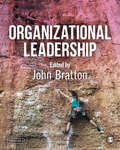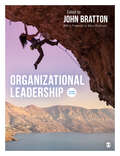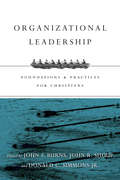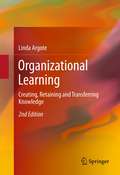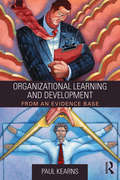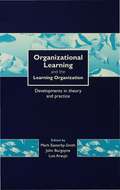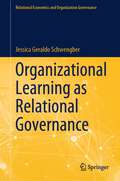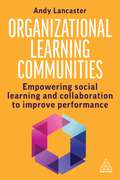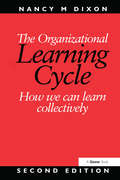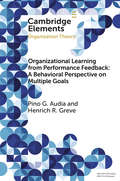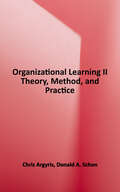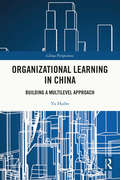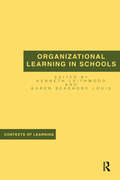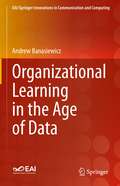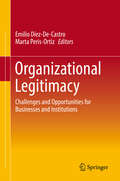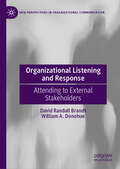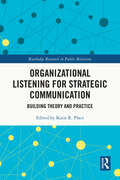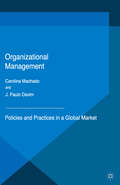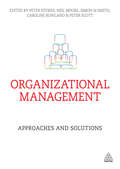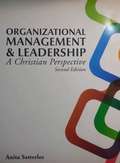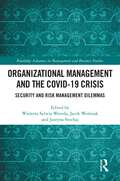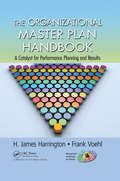- Table View
- List View
Organizational Leadership
by John BrattonOrganizational Leadership provides an accessible, critical and engaging analysis of what constitutes &‘leadership&’ today. Demonstrating leadership as an interconnected process between leaders, followers and context, the book ensures a rounded understanding of theory and practice to support students throughout their course and future career. Part 1: Contextualising Leadership examines the internal and external forces influencing leadership, addressing issues such as ethics, power, culture and innovation. Part 2: Leadership Theories reviews and analyses traditional and contemporary theories of leadership. Part 3: Managing People and Leadership builds on the idea of leadership as a human process and considers how complementary aspects of HRM can inform leadership practice and its outcomes on employees and organizational performance. Part 4: Contemporary Leadership considers topical issues including the shift of leadership studies towards followership, gender and leadership and pro-environmental leadership. Bringing complex theories and concepts to life through a range of case studies and examples, the book is further supported by a series of fascinating expert video conversations with those in leadership roles. From small social businesses to major multi-nationals, from the NHS to the frontline military teams, the videos offer a unique insight into the diverse reality of leadership in practice today.
Organizational Leadership
by John BrattonOrganizational Leadership provides an accessible, critical and engaging analysis of what constitutes &‘leadership&’ today. Demonstrating leadership as an interconnected process between leaders, followers and context, the book ensures a rounded understanding of theory and practice to support students throughout their course and future career. Part 1: Contextualising Leadership examines the internal and external forces influencing leadership, addressing issues such as ethics, power, culture and innovation. Part 2: Leadership Theories reviews and analyses traditional and contemporary theories of leadership. Part 3: Managing People and Leadership builds on the idea of leadership as a human process and considers how complementary aspects of HRM can inform leadership practice and its outcomes on employees and organizational performance. Part 4: Contemporary Leadership considers topical issues including the shift of leadership studies towards followership, gender and leadership and pro-environmental leadership. Bringing complex theories and concepts to life through a range of case studies and examples, the book is further supported by a series of fascinating expert video conversations with those in leadership roles. From small social businesses to major multi-nationals, from the NHS to the frontline military teams, the videos offer a unique insight into the diverse reality of leadership in practice today.
Organizational Leadership
by John BrattonUnderstand the reality of contemporary organizational leadership with the second edition of this thought-provoking textbook. Through an analysis of key theories and topical issues such as innovation, gender, power, ethics and environmental sustainability, the authors deftly illustrate how leadership cannot be extricated from the wider organizational context and why leadership is increasingly seen as a shared endeavour between leaders and followers. The book has been fully updated, with a new introduction discussing the challenges faced by leaders during the Covid-19 pandemic as well as a Foreword by Mary Robinson. NEW to this edition: A new chapter on Team Leadership looks at team dynamics, the role of technology in teamworking and the challenges arising for virtual teams A new chapter on Leadership and Artificial Intelligence covers the rise of AI and big data, and how AI affects the employment relationship and leader-follower relations A new Ethical Spotlight feature in all chapters explores ethical issues faced by leaders and encourages reflection Suitable for undergraduate and postgraduate students studying leadership. John Bratton is Honorary Professor in the Management School at Queen′s University Belfast, Northern Ireland.
Organizational Leadership
by John BrattonUnderstand the reality of contemporary organizational leadership with the second edition of this thought-provoking textbook. Through an analysis of key theories and topical issues such as innovation, gender, power, ethics and environmental sustainability, the authors deftly illustrate how leadership cannot be extricated from the wider organizational context and why leadership is increasingly seen as a shared endeavour between leaders and followers. The book has been fully updated, with a new introduction discussing the challenges faced by leaders during the Covid-19 pandemic as well as a Foreword by Mary Robinson. NEW to this edition: A new chapter on Team Leadership looks at team dynamics, the role of technology in teamworking and the challenges arising for virtual teams A new chapter on Leadership and Artificial Intelligence covers the rise of AI and big data, and how AI affects the employment relationship and leader-follower relations A new Ethical Spotlight feature in all chapters explores ethical issues faced by leaders and encourages reflection Suitable for undergraduate and postgraduate students studying leadership. John Bratton is Honorary Professor in the Management School at Queen′s University Belfast, Northern Ireland.
Organizational Leadership: Foundations and Practices for Christians
by Jack Burns John R. Shoup Donald C. SimmonsKingdom leadership does not begin and end at the church door. Christians are called to conduct leadership in government, commerce, schools, neighborhoods, families, para-church ministries and a myriad other contexts. God has given us many gifts, and our responsibility is to be stewards of those gifts, and use them to do the King's work. In that context, this comprehensive text explores key facets of leadership from a Christian worldview so as to equip people to conduct leadership more authentically than would be possible under alternative paradigms. The book begins with the seldom considered theological foundations of leadership while also tracing the historic roots of management, organization and leadership theories. All of this leads to a robust discussion of five essential challenges and practices--communication, negotiation, decision-making, financial stewardship and personal development. The combined efforts of these experts in the field provide a practical theology of leadership from a Christian worldview for emerging and established leaders. Here is the foundation needed for those who want to conduct leadership in a manner consistent with their faith in both religious and nonreligious organizational contexts.
Organizational Learning
by Linda ArgoteWhy do some organizations learn at faster rates than others? Why do organizations "forget"? Could productivity gains acquired in one part of an organization be transferred to another? These are among the questions addressed in Organizational Learning: Creating, Retaining and Transferring Knowledge. Since its original publication in 1999, this book has set the standard for research and analysis in the field. This fully updated and expanded edition showcases the most current research and insights, featuring a new chapter that provides a theoretical framework for analyzing organizational learning and presents evidence about how the organizational context affects learning processes and outcomes. Drawing from a wide array of studies across the spectrum of management, economics, sociology, and psychology, Organizational Learning explores the dynamics of learning curves in organizations, with particular emphasis on how individuals and groups generate, share, reinforce, and sometimes forget knowledge. With an increased emphasis on service organizations, including healthcare, Linda Argote demonstrates that organizations vary dramatically in the rates at which they learn--with profound implications for productivity, performance, and managerial and strategic decision making.
Organizational Learning and Development: From an Evidence Base
by Paul KearnsIt is now widely accepted that organizational maturity is dependent on being able to reorganize on a continuous basis and learn faster and more effectively than your competitors. Organizations that want to be sure they are competing at the highest level need clear indicators that their organizational learning and development capability is fully functional. This new book by Paul Kearns focuses on the need for an evidence-based approach to learning and development, bringing together the author’s extensive knowledge of HRM and organizational learning with new developments in the field. The book demonstrates how evidence evaluation can improve professionalism in organizational design and development, showing that this approach can create value not just for shareholders, but for employees and society as a whole. Organizational Learning and Development: From an Evidence Base is the perfect book for postgraduate students studying on evidence-based HRM courses and for the reflective learning and development practitioner.
Organizational Learning and the Learning Organization: Developments in Theory and Practice
by Mark Easterby-Smith Luis Araujo John G Burgoyne`The introduction chaper by Mark Easterby-Smith and Luis Araujo introduces the reader to the unresolved issues with which the field is still grappling today.... All in all, this is an interesting and useful book for both researcher and manager alike. First, and perhaps most importantly, the book incorporates multiple perspectives on learning - the psychological, sociological and the philosophical... Second, the book is neither purely theory driven, nor purely empirically driven. Theoretical contributions are complemented by empirical studies which help to illustrate the application of the theoretical contructs. I suspect that this would be of immense value to the practicing manager. Finally, the book provides a critical commentary on the state of the field in a nice compact way which should enhance its value to scholars in this area... a book which is both useful and interesting' - Organisational Studies `[M]ost importantly, the book incorporates multiple perspectives on learning - the psychological, sociological and the philosohical... provides a critical commentary on the state of the field in a nice, compact way which should enhance its value to scholars' - Organization Studies `A valuable resource for academics and practitioners in management and corporate strategy, as well as those involved in mangement training and development' - European Foundation for Management Development `This is a particularly interesting and useful work because it combines some chapters which deal primarily in concepts or indeed theories, and others which describe the experiences of trying to carry out the practices involved in creating both/either organisational learning and/or the learning organisation' -Industrial and Commercial Training 'The editors' overall assessment is that there has been insufficient dialogue between the two camps of action research and theorizing.... As a contribution to mapping this divided house, the text is an apt illustration of these problems. The editor's overview is of interest...' - Stephen Gibb, University of Strathclyde, MCB University Press The debates surrounding concepts of `organizational learning' and the `learning organization' receive a welcome synthezis in this book. International experts explore the links between the two fields of enquiry, which hitherto, despite their intersecting concerns, have represented separate constituencies, literatures and perspectives. The book provides a much-needed integrated framework of concepts and theories which draws on current insights from management cognition, theories of knowledge and learning, management practice and work psychology.
Organizational Learning as Relational Governance (Relational Economics and Organization Governance)
by Jessica Geraldo SchwengberThis book critically examines existing organizational learning theories that often center on employees and adopt a neo-classical organizational view. In this book, organizational learning (OL) is conceptualized from a relational governance perspective. Departing from the relational economics approach, it describes organizations as dynamic nexuses of stakeholders' resources and interests, extending beyond conventional intra-organizational contexts to encompass an open systems view. By viewing organizations as independent entities, distinct from individual stakeholders, the author introduces the concept of transactions as the fundamental unit of analysis in organization theory. Stakeholders contribute diverse rationalities, and OL emerges as the process of relationalizing these rationalities, enabling multi-contextual transactions within organizations. This book sheds light on epistemological and ontological challenges in OL literature, such as the OL paradox and anthropomorphism. To address these issues, the author advocates a shift from methodological individualism to methodological relationism, wherein OL becomes a micro-meso-relational process involving both stakeholders and the organization as an entity. Combining conceptual insights with empirical evidence from a multinational company's case study, the book showcases how relational learning can be practically applied in organizations. The findings corroborate the conceptual framework, supporting the notion of organizations as resource-rich nexuses and learning as a comprehensive relational process involving both entities and stakeholders. This book offers an essential contribution to the field. It appeals to scholars and practitioners interested in organizational studies, corporate governance, and relational economics.
Organizational Learning Communities: Empowering Social Learning and Collaboration to Improve Performance
by Andy LancasterLearning communities transform organizations through sharing knowledge, spearheading practice, solving problems, seeding innovation and supercharging development. So how can you develop a culture of learning in your organization? Organizational Learning Communities answers this question and explains how and why this approach can improve individual employee performance and drive overall business results. Written by a leading voice in the learning profession, this book contains everything that Learning and Development (L&D) practitioners need to know to successfully embed learning communities in their organizations. Following the 7Cs model of Cause, Culture, Conditions, Cadence, Content, Contributions and Credit, the book establishes the key factors that underpin thriving learning communities as well as the benefits of social and collaborative learning in the company. This practical guide establishes strategies to drive community impact and report success to stakeholders, drawing widely on evidence-based research and real-world examples. Each chapter ends with reflective questions to support transfer to the reader's context. This is essential reading for those involved in facilitating learning communities, or planning on pioneering one, to empower their organization's productivity and performance.
The Organizational Learning Cycle: How We Can Learn Collectively
by Nancy M. DixonThe Organizational Learning Cycle was the first book to provide the theory that underpins organizational learning. Its sophisticated approach enabled readers to not only understand how, but more importantly why, organizations are able to learn. This new edition takes the original concepts and theories and shows how they might, and are, being put into action. With five new or completely revised chapters, Nancy Dixon describes the kind of infrastructure organizations need to put in place; there are examples of knowledge databases, whole systems in the room processes and after-action reviews originating from organizations that are making real progress with these ideas. A clearer relationship between organizational learning and more participative forms of organizational governance is drawn, along with responsibilities that employees need to take on to enable, and partake in, collective learning. With new case material from BP, the US Army, Ernst and Young, and the Bank of Montreal, for example, this book shows how you can make use of the collective reasoning, intelligence and knowledge of the organization and channel it into its ongoing and future development.
Organizational Learning from Performance Feedback: A Multiple Goals Perspective (Elements in Organization Theory)
by Pino G. Audia Henrich R. GreveThis Element synthesizes the current state of research on organizational learning from performance feedback and develops a new perspective that deals with the influence of multiple goals. In keeping with the centrality of motives in Cyert & March's influential model, this new perspective rests on a foundation of individual level behaviors that are responsive to mechanisms at the organizational and environmental level of analysis. A key aim is to lay out an agenda for a new wave of empirical research on the interconnections of decision-makers, organizations, and the environment that influence organizational responses to performance.
Organizational Learning II: Theory, Method, And Practice (Addison-wesley Od Ser.)
by Donald A. Schon Chris ArgyrisA member of the PH OD Series! Organizational Learning II expands and updates the ideas and concepts of the authors’ ground- breaking first book. With new examples and the most up-to-date information on the technical aspects of organizational and management theory, Argyris and Schon demonstrate how the research and practice of organizational learning can be incorporated into today’s business environment.
Organizational Learning in China: Building a Multilevel Approach (China Perspectives)
by Yu HaiboFrom the perspective of behavioural science, this book systematically investigates organizational learning in Chinese organizations bsed on multilevel theory over the past 20 years. The findings contribute to the theory and practice of organizational learning and give insights into the construction of learning organizations.Revisiting existing studies on organizational learning, the author reconceptualises organizational learning and constructs an integrative model, which is corroborated and then supplemented by empirical research. Based on samples and materials from 3,000 managers and employees in organizations from all over China, the book further elaborates this integrative model covering the multilevel structure, trans-level functions and generative mechanisms that figure prominently in organizational learning in Chinese organizations. This framework helps enhance the organizational learning ability and the establishment of a learning culture, while offering possible directions for updating research methods and a stereoscopic theory of organizational learning.The book will be a good reference for management practitioners, students and academics interested in organizational behaviour, human resource management, innovation management, and multilevel perspective.
Organizational Learning in Schools
by Kenneth Leithwood and Karen Seashore LouisThis volume presents the view that what matters most are learning processes in organizations and ways of enhancing the sophistication and power of these processes. Each contributor, therefore, explicitly addresses the meaning(s) of organizational learning which they have adopted themselves.
Organizational Learning in the Age of Data (EAI/Springer Innovations in Communication and Computing)
by Andrew BanasiewiczThis book discusses the impact of advanced information technologies, such as data processing, machine learning, and artificial intelligence, on organizational decision-making processes and practices. One of the book’s central themes is the interplay between human reasoning and machine logic in the context of organizational functioning, specifically, the fairly common situations in which subjective beliefs are pitted against objective evidence giving rise to conflict rather than enhancing the quality of organizational sensemaking. Aiming to not only raise the awareness of the potential challenges but also to offer solutions, the book delineates and discusses the core impediments to effective human-information technology interactions, and outlines strategies for overcoming those obstacles on the way to enhancing the efficacy of organizational decision-making.
Organizational Legitimacy: Challenges And Opportunities For Businesses And Institutions
by Marta Peris-Ortiz Emilio Díez-De-CastroThis volume explores organizational legitimacy in business, featuring examples from a variety of industries around the world. Synthesizing the most current theoretical insights and best practices, the contributing authors examine the ways in which organizational legitimacy can be understood, its perceived influence on the market, and the relationship between organizational legitimacy and overall organizational success. The authors draw from different methodological perspectives to develop a holistic approach to organizational legitimacy that transcends the traditional concepts of corporate reputation, business ethics or corporate social responsibility. Historically, efforts to understand how organizations acquire, manage and use legitimacy have applied insights from institutional theory, resource dependence theory, organizational ecology and stakeholder theory, but the field has remained fragmented, despite the profound implications of achieving legitimacy for ensuring organizational stability, survival and sustainability through access to capital, resources and business opportunities, as well as problem solving, performance measurement and stakeholder support. Presenting case studies of successful initiatives, the book addresses: · How organizational legitimacy is defined and measured · How organizations achieve legitimacy and how they acquire resources · How different stakeholders (e.g., consumers, investors, employees) make legitimacy judgments and resource allocation decisions · Whether audiences in the same socio-cultural context arrive at shared legitimacy judgments with regard to a focal organization
Organizational Listening and Response: Attending to External Stakeholders (New Perspectives in Organizational Communication)
by William A. Donohue David Randall BrandtThis book argues that listening to constituents who reside outside organizational boundaries, but who are essential members of an organization’s ecosystem, is a vital constitutive element of organizational communication. It also attempts to demonstrate that, by and large, the field of organizational communication has neglected such listening. The book goes on to introduce a conceptual and methodological framework organizations can use to assess listening practices and effectiveness. Through a combination of theory, research, and case illustrations, the book will be valuable to both scholars and practitioners in the fields of organizational communication, marketing, and public relations. It will provide insight and direction for theory-building, knowledge development, and implementation of best practices.
Organizational Listening for Strategic Communication: Building Theory and Practice (Routledge Research in Public Relations)
by Katie R. PlaceEmbracing listening as a useful tool for strengthening organization-publics and organization-employee relationships, this book offers theoretical and practical insights for listening across myriad strategic communication contexts. Chapters authored by a diverse global collective of communication scholars and professionals present original research and case examples of listening for strategic communication in corporate, government, and nonprofit environments. They explore topics such as utilizing artificial intelligence and social media; activism, social justice, and ethics; and fostering diversity, equity, and inclusion within and outside organizations. Each chapter concludes with recommendations for strategic communication practice. This book will be of interest to researchers and advanced students in public relations and strategic communication, organizational communication, and listening.
Organizational Management: Policies and Practices in a Global Market
by J. Paulo Davim Carolina MachadoOrganizational Management.
Organizational Management: Policies and Practices (Management And Industrial Engineering Ser.)
by Carolina Machado J. Paulo DavimOrganizations are increasingly facing continuous and highly complex changes that require more proactive strategies, policies and management practices. Conscious of this reality, this book provides information and debate on principles, strategies, models, techniques, methodologies and applications of organizational management in the field of industry, commerce and services. Organizational Management communicates the latest developments and thinking on the organizational management subject world-wide, and seeks cultural and geographic diversity in studies and uses of organizational management that have a special impact on organizational communications, change processes and work practices. With an emphasis on the way organizations define and develop their management policies and practices in order to acquire more competitive advantages in the global market, this book is crucial to any practitioner or researcher of current organizational management.
Organizational Management
by Neil Moore Peter Scott Caroline Rowland Professor Peter Stokes Simon M SmithOrganizational Management is ideal for readers who need to understand modern organizations. This book enables students to understand the key issues of organizational behaviour and how to take a critical approach when planning, leading and engaging a workforce and its resources. The book provides fresh perspectives on known models and critical theories on leadership, teams, performance management, employee engagement and change. The authors also offer the reader innovative approaches to leading-edge issues such as trust, internet use, generational trends, the use of the arts in organizations and leadership from a systemic perspective. Organizational Management draws on examples from the authors' international work across a range of business and industrial sectors, both public and private, and is supplemented by activities, revision questions, recommend reading and online resources to deepen learning.Rapid technological advances, constantly changing global environments and new kinds of workforce cultures mean that organizations are constantly being challenged. This book equips the reader with the ability to navigate this turbulent environment through both established and novel forms of organizational management.
Organizational Management and Leadership: A Christian Perspective (2nd Edition)
by Anita SatterleeOrganizational Management and Leadership: A Christian Perspective was written to provide the essential skills and knowledge needed to effectively lead and manage in contemporary organizational environments. While most books on the subject focus almost entirely on the business needs of large corporate operations, Organizational Management and Leadership: A Christian Perspective recognizes that the vast majority of readers are not employed by large corporations whose primary purpose is shareholder wealth and bureaucracy. Rather, the average reader is employed in a variety of small-to-medium organizations, be they for-profit, not-for-profit, or governmental. While some books published in the popular press discuss Christian aspects of doing business, they do not integrate academic content and practice with the Biblical principles. Herein lies the great value of Organizational Management and Leadership: A Christian Perspective to the Christian Higher Education community: the first textbook in the field which allows the student to integrate Biblical principles with academic and practical learning.
Organizational Management and the COVID-19 Crisis: Security and Risk Management Dilemmas (Routledge Advances in Management and Business Studies)
by Wioletta Sylwia Wereda Woźniak Jacek Stochaj JustynaThe COVID-19 pandemic has re-shaped organizations on many levels: resource, process, structural and relational. Such a wide range of forced changes has resulted in a greater need to implement risk management principles and procedures to secure an organizations position in the market. This book presents selected and key aspects of managing contemporary organizations in the conditions of the COVID-19 pandemic, enriched with empirical analyzes relating to various countries of the world. This edited collected focuses on clarifying and solving basic management dilemmas, integrated issues of risk management and organization security in light of changes during the COVID-19 pandemic. It specifically explores the following common problem areas, across industries and sectors, using theoretical, empirical and practical perspectives: - financial, economic and regulatory conditions for management processes in the conditions of the COVID-19 pandemic; - management of information resources and security in the conditions of the development of the phenomenon of digital risk and e-commerce; - shaping relationships with stakeholders - with particular emphasis on relationships with customers in the conditions of sales processes; - shaping the processes of creating and diffusing knowledge, with particular emphasis on the activities of educational entities. Organizational Management and the COVID-19 Crisis will be directly relevant for researchers and academics across a range of management disciplines, including strategic management, risk management, organizational studies, information and knowledge management and related fields.
The Organizational Master Plan Handbook: A Catalyst for Performance Planning and Results (Management Handbooks For Results Ser.)
by H. James Harrington Frank VoehlFor visionary leaders, an Organizational Master Plan and associated technologies have become essential components of strategic decision making. Written for leaders, planners, consultants, and change agents, The Organizational Master Plan Handbook: A Catalyst for Performance Planning and Results explains how to merge the four planning activities tha
